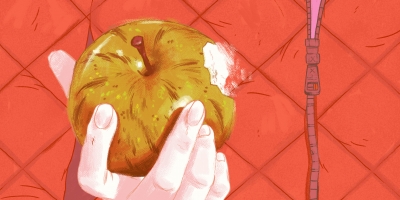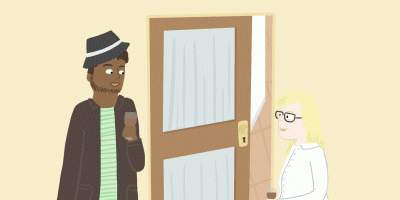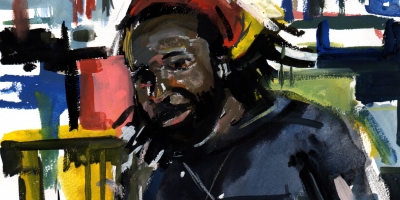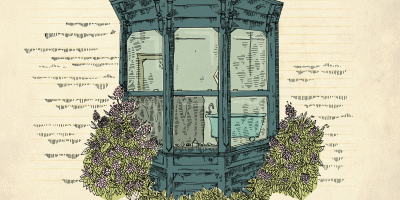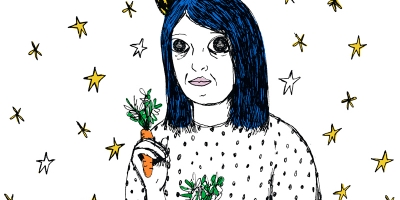Fiction
Ethel Chu Walks Through the Valley of Oreos
by Randall Jong

Lying on her back at the Saint Francis Memorial Hospital, a nasogastric tube crammed into her left nostril, Mrs. Ethel Chu fantasized about robbing the Nabisco Headquarters in Hanover, New Jersey. Not for their money, but for their delicious cookies. She imagined a platinum vault with tons of flavored Oreos, secret underground labs crowded with huge steel drums, and confectionary ovens the height of three-story movie screens. That would be so much fun: touring that whole facility, wandering into random vaults, eating as much as they had to offer, and smuggling new recipes back home to San Francisco. She could buy a box of Oreos from any supermarket or liquor store, but the headquarters, she imagined, concealed the tastiest breeds, the avant-garde versions of America’s favorite snack.
“We’re cutting trans-fats, like those disgusting Oreos,” Lori said, shutting the notebook of her hand-drawn food diagrams. “The doctor said soft foods. No more processed junk. That stuff is killing you.”
Lori leaned across Ethel’s bed with a calculated scowl, as if studying a primitive specimen. She did not look like Ethel, no traces of stomach blubber or chin fat. She’d acquired her physique from Bill’s side of the family. Her tiny frame of tiny bones could not grow taller than four feet, eleven inches. Although she was often mistaken for a teenager, she was thirty-seven years old, an age that seemed too old for her size.
Ethel’s bowel obstruction, which the doctor had tentatively diagnosed a few nights ago, had revived her daughter’s most aggravating lectures. For the last four days, she’d had to listen to Lori’s soft-food diet plans, her theories about mental weakness, and an impossible thirty-minute exercise called “Insanity.” Ethel could not withstand that much punishment—though maybe she deserved it. But regardless of her bad choices, of which she accumulated many, Ethel needed Lori to sit down, shut up, and relax.
The stomach pump retracted pockets of brown intestinal matter into a plastic container that hooked next to Ethel’s bed. She watched the matter siphon out her nose and through the tube, marveling at the digestion process. Dripping in the container of brown fluid somewhere were the processed cookies from the night of her sharp abdominal pain. She felt oddly hungry looking at that mush. She hadn’t enjoyed a solid meal for almost a week. A plate of twelve Oreos and a glass of whole milk, no matter how destructive the doctor said it was, was the only thought lifting her spirits in this overwhelmingly yellow room.
“Mom, you’re going on a liquid diet,” said Lori. “We’ll juice your vegetables. Add some fruits and unsweetened almond milk. The possibilities are endless. I’ll make jook! It can’t be that hard to cook. Some chicken stock, some white rice, some ginger. I should write this down. Make a list. Okay? Mom, are you listening?”
Ethel wasn’t listening.
The platinum door opened, moaning angelically, as she crossed into Nabisco’s main vault. A hundred golden chutes hung from the ceiling, pumping out different-flavored Oreos onto the wax-paper floor. Each pile rose five stories high, and she counted the flavors: chocolate shells with white cream, white shells with pink cream, green shells with orange cream, yellow shells with purple cream. The vault was made of these crumbling valleys, carved from years of production. She plucked one from the first pile, a chocolate shell with white cream, and bit into it. Unlike the stale supermarket cookies, it was freshly baked and warm. She ran to the next pile—white shells with pink cream—and ate one. Then she moved onto another pile, and another, until the flavors tasted like one sweet cookie. She hugged the valley’s wall, gorging as fast as she could, scooping the cream with her tongue. Surrounded by Oreos, lost in this massive paradise, she could hear someone calling.
“Try this one!” Bill shouted from above. He stood on the green shells with orange cream pile. He was nineteen and skinny. “There’s something I want to show you!”
When she reached for him, eager to know what he wanted her to see, a heavy pain knotted in her abdomen. She pressed her hand to the place where the pain grew and clenched her teeth until the moment passed, and it did. The heaviness was gone, but the hospital bed emerged from under her as she stared at Lori’s trembling mouth.
“The fact that you don’t need surgery is a blessing,” her daughter was saying. “Don’t you understand, Mom? Don’t you get it? It’s time to change.”
The hospital released Ethel the following Monday morning. Lori, driving a new green Prius, brought her home to a quiet corner of Tenth Avenue. Three of Ethel’s garbage bins, each of them stuffed to the top, stood outside the driveway. The compost bin rattled. Lori grabbed a broomstick from the garage and smacked the bin. They heard a muffled screech, and a scrawny raccoon leapt from under the lid and scurried over a neighbor’s front gate.
“They’re everywhere.” Lori smacked the bin again. “Last night I saw three of them clinging to a telephone pole, waiting for me to leave.”
“What’s in my bins?” Ethel wanted to take a peek. “I haven’t thrown anything away.”
“Mom, I have a surprise for you.”
Lori led her inside. At first glance, Ethel didn’t notice anything different about her place. But then she sniffed a daunting fragrance of cinnamon bark and lemon balm. Sitting on the windowsills, which were once decorated with old Christmas cards and loose change, were arrays of potpourri in ceramic bowls. She stepped farther inside and found a spacious living room, the sunshine coating the white carpet. Where were the half-empty Oreo boxes, the stacks of Bill’s newspapers, the sandwich bags of his used Band-Aids, and her collection of glass and aluminum bottles worth five cents each? Her houseplants, areca palms that had survived for ten years, were missing from the sun-spot window. Nothing, not even the glass ashtray that was now being used as a fruit plate, smelled like home anymore.
“Wait until you see the kitchen,” Lori said.
From top to bottom, the cabinets were cleared out, except for a few bags of white rice. Lori had excavated the refrigerator and freezer—butter, condiments, plates of leftovers, Klondike bars—and replaced everything with leafy vegetables and a carton of almond milk. Then the worst: Ethel checked the far left cabinet, the one closest to the sink. The bright colors and fat letters of Nabisco’s brand names were nowhere to be found. Something moved in her stomach. A fantastic rumble.
“Veggie shakes!” Lori set a large, intimidating machine on the counter. In solid silver lettering, it declared itself the Elite900 Juicer. What a name! Was Lori going to make shakes with this thing or feed wood through it? She packed the feeder with celery stalks, kale leaves, and half of a Honeycrisp apple, and then flipped on the blades. There was a high-pitched whirr—a clean, professional sound—and the machine shredded the vegetables into a shallow green paste.
“I forgot to buy berries, so we’re going to have to make do,” said Lori. “Look at it this way: the grosser it tastes, the healthier it is for you! Are you ready?”
Ethel was ready, but not for juice.
Bill jumped off the Oreo pile, disappearing behind it. His echo bounced throughout the vault, disrupting the valley so that crumbs hailed before her feet. Hurry! Hurry! She caught glimpses of Bill zigzagging around the piles, his thin limbs swinging freely. She wanted to call out to him, ask him where they were going, but every time she opened her mouth, crumbs would pour in front of her. She was looking for Bill, not at the ground, when she slipped effortlessly on a sleet of black crumbs and fell on her back, bouncing her head on a soft cushion of cream. Bill was saying something, but she couldn’t hear him.
“Stop staring at the cabinet. I threw everything out.” Lori gave her a few ounces of green juice. Bits of celery floated to the foamy surface. “Drink this.”
Ethel held the glass up to the window and found that light could not penetrate the juice. It reeked of sour grass. She stared at Lori chugging her own glass of vegetable sludge.
“You can’t expect me to drink this,” Ethel said.
Lori scrunched her forehead and puckered her lips. She covered her mouth and dry-heaved. She was trying so hard to regain composure. “Bitter isn’t the right word, but…”
Ethel sipped her juice and heaved too.
“Oh, stop it!” She said, slamming the glass on the counter. “It’s bitter. It’s just bitter!”
Hours later, Ethel watched Lori wrestle with the jook, the whole place choked in bland steam. Lori stirred the white rice in boiling water, her hand shaking as she sprinkled pepper into the pot. A bubble popped, grazing her arm, and she recoiled from the stove. She was incapable of maintaining an even temperature, switching from high to low, low to high. Ethel would’ve suggested letting the jook simmer, but she decided it was best to watch Lori burn the damned thing.
“You could’ve left one box,” Ethel said.
“I could’ve left two or three. I could’ve left a lot of things.” Lori dodged another popping bubble. She handed the spoon to Ethel. “You stir. You’re much better at stirring than I am.”
They sat across from each other at the dinner table, bowls of potpourri and jook between them. Lori blew the steam from her spoon and smacked her lips—an unnecessary exaggeration—after every bite. The jook was flavorless. Maybe, if Ethel really concentrated, she could detect an aftertaste of chicken stock. She stared at Lori, begging silently for a real savory dinner. Then, if her stomach didn’t hurt, a little dessert afterward, possibly a pinch of ice cream and a couple of Oreos? Lori finished her jook without saying anything about the blandness and finally acknowledged Ethel’s side of the table: the spoon untouched, the jook cold.
“Mom, eat.” She tapped her bowl. “Go on. Eat it.”
“Isn’t there something else we could make?”
“This is what you’re eating for the next month. Your intestines can handle solid food. We still don’t know what’s wrong with you. A bowel obstruction? Diverticulitis? Stomach cancer? It could happen again. You’re stupid to think otherwise.”
“I’m not stupid,” Ethel mumbled.
“Eat whatever you want.” Lori pushed the chair back, threatening to storm off, like she would when she was a little girl. “But don’t think I’ll watch you fuck up like Dad. I really hope you remember what that was like. Because if you’ve forgotten how worried we were, how insane you went after his second heart attack, then you are stupid.”
Ethel snagged her spoon—anything to shut Lori up—and dug into her bowl. She ate furiously, racing the oncoming blandness. She plowed through layers of rice and water like a shovel through wet cement.
As she scraped the bottom of the bowl, her glossy lips sticking together, Lori raised her voice: “That’s the other thing! Slow down. You don’t give yourself any time to digest. You pile it in until you get sick. Do you need me to teach you how to eat? Mom? Do you hear me?”
What Ethel heard was the Nabisco doors turning their hinges. She stood underneath the golden chutes that hung from the ceiling and inhaled the rich scent of the Oreo catacomb.
“What is that?” Bill came behind her, concerned.
“Jook. Lori made it.” Ethel dropped the spoon and burped.
“Here.” He offered her a classic Oreo. “I want to show you something.”
She didn’t eat the Oreo, keeping it tight to her chest, and followed him to the end of the vault where a yellow pond, emerging from nowhere, glistened on the floor. She knelt by the pond, brought her nose to the surface. The water was dense like lava and smelled of spice.
“Nacho cheese,” Bill said. He dipped an Oreo in the hot pond and slid his teeth into the soft shell. He sighed as he would when he ate good cooking. He was a very handsome man. There was purity to his black hair and smallness to his body, as if he could burrow a nest in the earth and keep warm for a long time.
“Bill, that’s disgusting.” Ethel dipped her pinky into the cheese and sucked it. Sweet and salty, a hint of jalapeño. She took another taste.
“You sound like Lori. I can hear what she says, you know.”
“You can hear her through the walls?”
“The floorboards.”
“She’s been hard on me, like she was hard on you.” Ethel lathered her Oreo in cheese, a perfect yellow bulb. “I understand where she’s coming from. I do. I yelled at you, and you kept doing whatever you wanted. But Lori has to learn that certain circumstances are inevitable.”
“What’s inevitable?”
“A silent place.” Ethel inspected the Oreo—beautiful—and bit into it. “When I wake up, I don’t hear a thing. Maybe leaves on our window, if it’s a windy morning. But that’s it. Sometimes it’s nice. I make it a game, listening to sounds I usually ignore. Other times, I get scared. I catch a noise from another room that I know is empty and think it’s a ghost. I like to think it’s you. But I can’t think like that for too long. I spend most of my time inside, eating. I’m always hungry. Why am I always so hungry?”
Bill handed her another Oreo from his pocket.
“This will make you feel better.”
The cheese and cream coated the gaps between her teeth, molding to the roof of her mouth. Savoring the nacho-chocolate flavor, Ethel grabbed Bill’s hand and held him for as long as the taste lasted. Almost immediately, as the flavors changed into a ghostly staleness of rice and water, Bill let go of her and headed through the valley of Oreos. When she stood to follow him, her abdomen twitched in pain. She dropped to her knees. The nacho-cheese pond, as she looked, turned into an empty white bowl.
Chunks of jook stuck to her lips. The stench of lemon balm, like a bitter chemical, pinched her nose. She sneezed, sending flecks of jook and snot onto the tablecloth.
When she looked up to apologize, she saw Lori digging through her wallet and shouting: “I’m taking your cash and credit cards. I know you. Once I leave, you’re going to drive to the nearest market and buy Oreos and chips. I don’t want to get another frantic call at two in the morning to rush you to the hospital again.”
Lori left Ethel’s place around ten o’clock that night. She shoved the whole pot of jook in the refrigerator and washed their dishes. As she was about to leave, car keys in hand, purse around her arm, she said “I love you.” A true but tired statement.
“Give me back my credit cards,” Ethel said, “and I promise I won’t go to the supermarket.” Although, she thought, it was exactly what she would do.
But it was too late to argue. As Lori pulled out of the driveway, she pointed to a telephone pole where six gleaming eyes looked down on them. They were big-bodied raccoons, gray shadowed clumps in the wires. “The broomstick is in the garage,” Lori shouted from her window. “They hate the broomstick.”
Ethel could see Lori’s rear view lights, red as a pair of Twizzlers, turning right and disappearing for good. The raccoons descended the telephone pole, cautiously making their way down until Ethel looked at them. Then they froze and waited for her to get inside, which she did.
To cap her first night back at home, she skimmed the channels on TV. CBS was showing a special on obesity in America, interviewing nutritionists who agreed that fried and processed foods were evil. On the Food Network was a torturous documentary entitled The World of Nabisco, which began with a vintage rerun of a 1968 Oreo commercial that Ethel remembered from when she was a teenager. A black and white cartoon of a boy eating Oreos, and a narrator who spoke into a crackling microphone: Once upon a time, there was nothing in the world but a little boy and his Oreo cookies. Rich and chocolaty outside, smooth and creamy inside, and that was enough…
Ethel was starving. She opened the fridge, but the jook only looked even more unappetizing since Lori had left the apartment. She tilted the pot over the sink, dumping the first layer down the drain. From the kitchen window, she could see the raccoons opening the compost bin. The biggest one pushed the lid open with his head as the other two slipped inside. She admired their innovation, their teamwork. She decided to do something less wasteful with the jook.
She carried the pot outside and placed it by the street. Then she tapped the compost bin with the broomstick. The raccoons, as expected, leapt from the bin and burrowed themselves into the nearest sewer drain. Hoping that they would understand her kindness, she moved the pot to the drain and waited for their little gray heads to surface. They never came up.
Deciding that she needed to sleep off the hunger, Ethel turned to go inside. But as she did, she noticed the bin’s lid flapping open. Crumbs scattered onto the sidewalk. An empty Oreo box fell from the rim. Everything that Lori had thrown was exposed in the darkness. Broken Ritz crackers, melted Klondike bars, chipped Oreos, all of it piled to a shapely peak.
A sourness of rotten vegetable skins lingered on the bin. But she could handle it. She plucked the most delicate Oreo, discerning only now, after so many years, the shell’s design: heart-shaped petals on twelve symmetrical flowers. Why flowers? She popped it in her mouth, chewed slowly, caressed the taste. Purest chocolate and cream. Her first solid meal since last week. She scouted the neighbors’ windows in case someone was watching, but every household was dark, as if on a Monday night no one cared to turn on a light.
At first, she ate calmly. Chocolate and cream. Crunchy and sweet. Then she began to eat faster, digging into the pile, feeling around for the Oreo shells, tossing aside anything but those lovely, chocolaty flowers. She heard squeals behind her. The raccoons splashed their hairy feet in the pot, their bushy tails hugging the edges like spoon handles. Eyes bulging, mouth wet, she slowed down. She could almost hear Lori shouting from afar.
But before she could compose herself, a pain knotted in her abdomen. Quick and sharp like a bullet in the belly. She keeled onto her butt and watched the raccoons tear at each other. There was no teamwork, she realized, only hunger and desperation.
High beams ran over the driveway. The raccoons, oiled in jook, scurried up a telephone pole and watched from above.
“Mrs. Chu?” said her neighbor, a person who she had seen twice in her life. “It’s Mary from the corner house. Are you all right? Squeeze my hand if you’re all right.”
She tried to squeeze, but lost strength. Mary dialed 911 on her phone and screamed at an operator. Her message was as hysterical as Lori’s would have been, and in some way, that was comforting. Ethel wanted to correct her: it was not a heart attack or stroke, but a momentary pain. But she decided, until the ambulance arrived, to sit back against her neighbor’s arms and fantasize about robbing the Nabisco headquarters with her family.
Bill and Lori waited for her by the nacho-cheese pond. Lori tried to split an Oreo, but couldn’t because her hands were too small. Bill gently twisted it apart for her. “Thank you,” Lori squeaked and licked the cream. They dipped their cookies into the pond and ate. Ethel watched them, missing them. She felt the ground rumble. The golden chutes began to snap and tear from their fixtures. Rumble. The valley caved inward, and the piles descended into the cracks. These Oreos didn’t seem so appetizing. They looked like brown matter, liquefied.
“Aren’t you going to have one?” Bill said.
“No, no.” Ethel rubbed her stomach. “I don’t think I can.”
